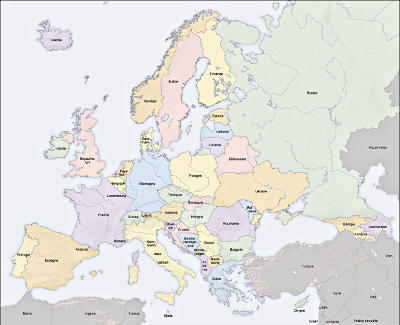 Le 29-03-2019 par A. Noble
-
Le 29-03-2019 par A. Noble
- 

MUTINY ON THE EU'S FLOUNDERING SHIP OF FOOLS
by Professor Arthur Noble
The ‘Ship of Fools' is an allegory in Book VI of Plato's Republic, written in approximately 380 BC, but it has a close parallel in the ‘vessel' which today we call the European Union. In fact, Plato's ship is, up to a point, the very epitome of the EU. It has a captain who is the equivalent of today's collective Brussels elites. He and his crew are all metaphorically ‘at sea', i.e. they are drifting without any idea where they are going or where their precious EU superstate project will wash up. Even worse, they appear to be unaware that their ship is rapidly sinking. The captain, though stronger-willed than any of his crew, is hard of hearing, his eyesight is poor, and his knowledge of navigation is defective.
The members of the crew, like the leaders of the member countries of the EU, quarrel with one another about how the ship should be steered and in what direction. They beg the captain to let them control the helm, despite admitting that they have never having learned the skill of navigation.
The chaotic events unfolding across the EU are a result of the reality that neither the Brussels dictators nor their loyalists know where they are going. They bully and threaten their opponents and force them to change any democratically expressed opinions by rerunning referenda until the desired answer is given. Despite the recognition that their cherished European project is floundering, they obstinately cling to it, taking their mutineering crew members hostage as if to drag the whole project down in a seeming death wish.
Here the similarity with Plato's allegory ends. After the UK came to its senses and voted to abandon ship, more than half of the rest of the European population expressed their desire to be freed from the fangs of the Brussels elite, but like the Yellow Vests' current new French Revolution they were ignored. The result has been the most serious crack yet in the fundamental structure of the EU – a division of the bloc into two distinct and opposing camps – globalists and populists – who are now locked in a conflict which will either destroy the EU entirely or radically reshape it.
A new treaty
On 22 January 2019, exactly fifty-six years after their predecessors Charles de Gaulle and Konrad Adenauer signed the Elysée Treaty.1 of friendship and cooperation, centred on matters pertaining to the EU, the embattled President Macron and the calamitous Chancellor Merkel jointly made a desperate attempt to rescue the now sinking Franco-German partnership that hitherto has been the mainstay of the EU.
The symbolism of their new agreement, called the Treaty of Aachen, could not be more significant: Aachen, called in French Aix-la-Chapelle, is a border city historically famous as the seat of power of Charlemagne, the ninth-century founder and ruler of the Holy Roman Empire, on whose idea the unity of Europe was based and which the EU project has been trying to revive.
The problem, however, is that the new Treaty of Aachen is technically a private treaty which as such ironically actually breaches the EU's own rules which stipulate that treaties must be approved and signed by all members of the bloc. Thus, ironically, while intended to rescue the floundering EU, it is also a symptom of the EU's accelerating breakup. The Express reacted with the headline “EU self-destruct: Macron and Merkel's pact threatens to tear bloc apart as Tusk lets rip”.2
It declares the intention of France and Germany (only) to cooperate in various areas, including foreign policy, the economy, transport and humanitarian issues, and – most questionably – the creation of a joint European army, which Merkel said would not be a counterpart to NATO but would complement it. As a permanent member of the UN Security Council, France also pledges in the treaty to assist Germany attaining the same status. Therefore it will be difficult to reconcile the enthusiasm of France during the last decade to use force against foreign nations – including joining in NATO's destruction of Libya in 2011 and sending troops to Mali – with Germany's reluctance for historical reasons to engage in such global adventurism, apart, of course, from its significant military involvement in NATO's bombing of Yugoslavia in 1999. Germany did not join in the illegal American missile strikes on Syria, did not send troops to Libya in 2011, and banned arms sales to Saudi Arabia after murder of dissident journalist Jamal Khashoggi.
Panic in Brussels
This new Treaty of Aachen actually has little or nothing to do with Franco-German relations as such, which are good: it is a panic reaction by the Brussels elite to uphold the domination of Germany and France within the EU as a whole at a time of rapidly increasing populism and nationalism across the bloc resulting from Brexit, the anti-Macron violence of the Yellow Vests movement, and the reality that Italy, Hungary and Poland are not playing the EU game as Brussels wishes.
Macron described the signing of the Aachen Treaty as signifying a “new” Franco-German responsibility for Europe which would provide the EU with the tools for its overall sovereignty in terms of defence, security, space, migration, the environment, etc., but as he exited the building after the signing, the Yellow Vests shouted abuse at him and demanded his resignation.
The chief worry of Brussels is the new Rome-Warsaw Axis which has now emerged and which Hungarian Prime Minister Viktor Orbán says is capable of wresting responsibility from the failing Franco-German Axis and governing the EU. The Aachen Treaty is a response by Macron and Merkel who are talking up the fight against those whom EU Council President Donald Tusk has accused of wanting to see the European project fail:
“I will put it bluntly: today Europe needs a clear signal from Paris and from Berlin that strengthened cooperation in small formats is not an alternative to the cooperation of all of Europe.”
EU Commission President Jean-Claude Juncker also still desperately clings to French-German cooperation as the only real champion of Europe's future.
It is symbolical that the signing of the Aachen Treaty was accompanied by the strains of the European, German and French national anthems to the exclusion of all others. Anger against the treaty has been expressed across the whole EU, but even within France and Germany themselves. The President of France's National Rally Party, Marine Le Pen, warned: “By signing this pact on the quiet Emmanuel Macron is committing treason.”3 Germany's Alternative für Deutschland Party declared that it erodes German sovereignty.
EU splitting in two
Most significantly, the unity of the EU is now threatened by a broad internal conflict between the Franco-German Axis and the rising Rome-Warsaw Axis, in which the new Eurosceptic Italian Government is playing a major role. Italy is building an anti-EU axis.4
Italian Deputy Prime Minister Matteo Salvini has deplored the fact that Europe has become accustomed to being ruled by France and Germany. He is seeking a new balance and calling for a radical change, announcing: “Poland and Italy will be the protagonists of this new European Spring.”5 His latest salvo in his ongoing feud with Paris was fired in Facebook, namely his hope that the French people would use the opportunity of the 26 May 2019 European Parliament elections to “rid themselves” of the “terrible” leadership of Macron and “take back control of [their] future, destiny, and pride”.6
Salvini has called on fellow nationalists to take part in a “renaissance of European values” to bring an end to the “German-French axis” in the EU. Denouncing Macron as “a laboratory-invented product to stand in the way of any change” and “a President who is against his people”, he turned to the issue of immigration and described him as a coloniser: “People are leaving Africa partly because some European countries led by France have never stopped being colonisers.” He recalled that Italy too had colonies, but that France had never let go of its own: “There are dozens of African countries in which France prints its own currency, the Franc of the Colonies, and with that currency French public debt is financed.”
Salvini's coalition partner Luigi Di Maio of the Five-Star Movement has accused the Brussels politicians of having become “deaf to the needs of citizens who have been kept out of the most important decisions affecting the people”.7
FOOTNOTES
Lien permanent
Partager : 


 Le 29-03-2019 par A. Noble
-
Le 29-03-2019 par A. Noble
- 

![]()
![]()


